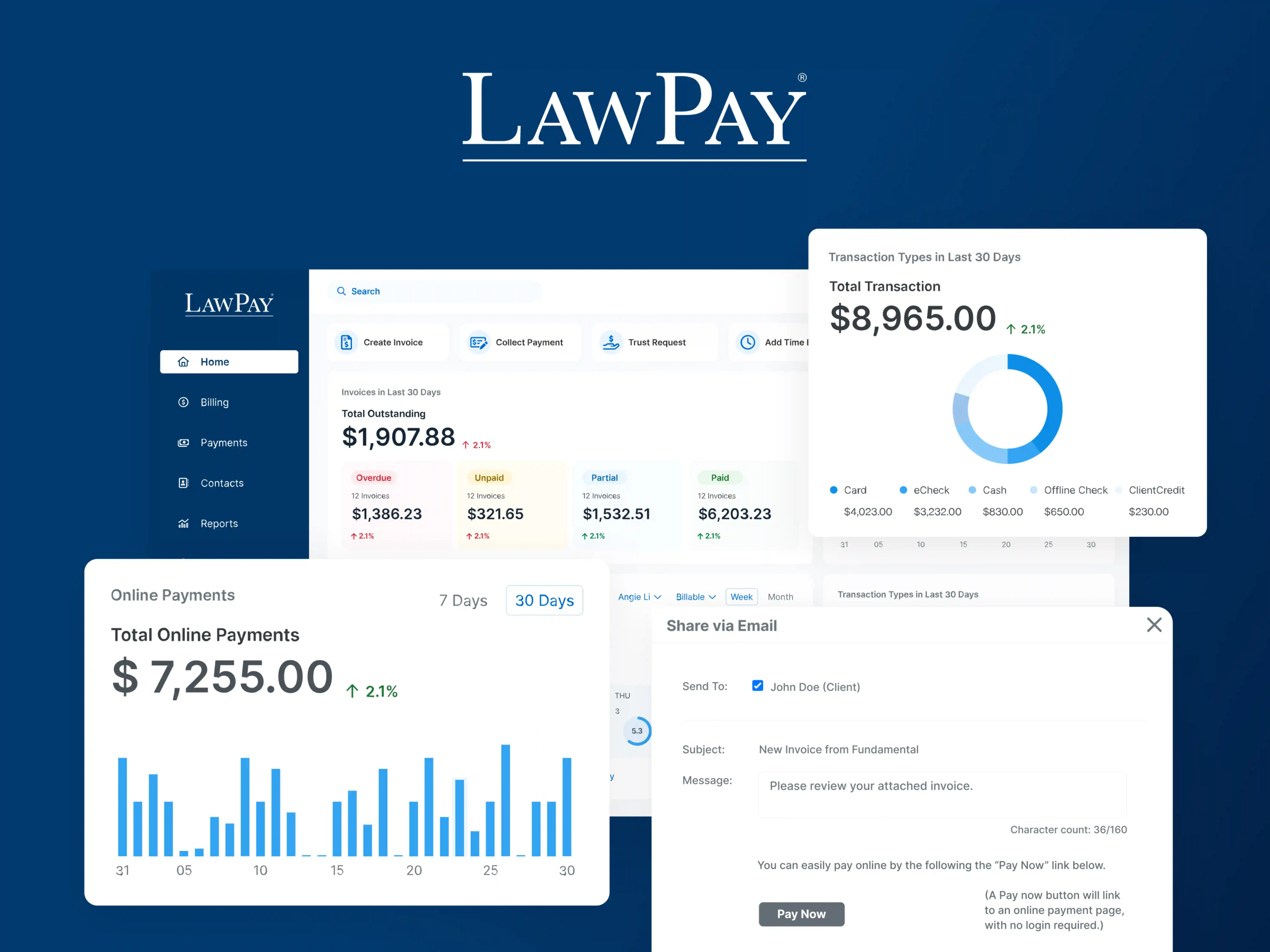Your clients' service expectations are shaped by modern-day digital payment experiences. If they can make fast, direct payments to Amazon, their bank, and their landlord, they will expect your law firm to provide the same convenience.
Fortunately, you can fulfill that client demand with an Automated Clearing House (ACH) payment option. Even better, implementing ACH payments for your law firm streamlines billing on both sides of the transaction. Your clients are happier and your firm gets paid more efficiently.
Read on to learn the basics of ACH for law firms, including the advantages of ACH payments, how to accept ACH payments, the differences between ACH and other payment methods, and how to choose the right ACH partner.
Schedule a demo to see what LawPay can offer your firm.
Book Now
What Are ACH Payments?
ACH is a network that supports direct, electronic funds transfers from one bank account to another. There are different types of these electronic transfers, such as ACH payments and eCheck payments.
The ACH network is governed by an organization called Nacha. Nacha defines and enforces the operating rules for ACH transactions. This is how the network remains safe and secure for banks, businesses, and consumers.
ACH payments are very popular. Businesses commonly use ACH for direct deposits of employee paychecks and periodic payments for subscription-based services. In the third quarter of 2022, $7.6 billion changed hands via ACH.
Your firm could implement ACH billing as a more flexible, efficient alternative to paper checks, debit and credit card payments, and wire transfers. In addition, ACH can support scheduled payments, split payments, and recurring or automated payments. ACH payments also clear faster than paper checks and cost less to process than card payments and wire transfers.
Why Should Law Firms Accept ACH Payments?
The advantages of ACH payments for law firms revolve around speed, convenience, compliance, and cost-efficiency. Let's walk through each of these in more detail.
ACH Payments Are Faster Than Checks
ACH payments usually arrive in your account as usable cash within five business days. Paper checks are held according to the deposit rules of your bank. A conservative bank may hold paper checks for up to two weeks.
ACH Payments Are Convenient
Clients who pay via ACH do not need to write a paper check, address an envelope, use a stamp, or drive into your office. They can simply fund their bill from home with a few clicks.
The efficiencies of ACH are magnified when your firm offers installments or sets monthly fees. By setting up recurring ACH payments, they will process as scheduled—with no further action required from your firm or your client. There is also no expiration on ACH arrangements. The payments continue until canceled.
ACH Payments Are Cost-Efficient
The median cost to accept an ACH payment is $0.26 to $0.50 per transaction. Businesses with less than $5 billion in annual revenues often pay less than that. Their median range is $0.11 to $0.25. These numbers come from the AFP's 2022 Payments Cost Benchmarking Survey, cited by Nacha.
The median cost for accepting paper checks is much higher, ranging from $2.01 to $4.
ACH Payments Are Safe
ACH electronic payments are safer for your clients than check-writing. Every paper check exposes your client's account and routing number. With ACH billing, the sensitive data is shared one time only, when the payment is established.
All ACH payments must adhere to ACH law, officially known as Nacha Operating Rules and Guidelines. Nacha requires compliance with these operating rules from all participating financial institutions.
Nacha also enforces ACH compliance, in part, by welcoming violation reports. If one financial institution reports a potential violation, Nacha researches the issue and, when necessary, requires resolution by a specific date. This diligent enforcement of ACH law keeps the system secure.
As a result, the ACH system will keep your client’s sensitive information secure and your firm within compliance. If there is a problem, federal law generally protects your clients from costs associated with ACH mistakes.
How to Accept ACH Payments
Setting up your ACH payment system is not difficult, but there are a few steps needed to ensure a seamless transition:
1. Verify ACH Billing Works for Your Client Base
The ACH network processes payments between U.S. and Puerto Rico bank accounts only. If your law firm has a large international clientele, ACH payments won't be as useful.
2. Select an ACH Payments Provider
You'll face less risk by choosing an ACH payments provider that specializes in law firms. Your law firm is subject to different accounting processes than, say, a retail store. Your ACH partner plays a primary role in supporting compliant and ethical trust accounting.
3. Set Up an ACH Platform That’s Easy to Implement
The ACH setup process should be straightforward. It involves sharing information online and connecting your accounts and systems. You will also add ACH payment instructions to your law firm invoices.
4. Choose a Secure ACH System
Before you can accept payments from the ACH network, you need authorization from your clients. Your ACH partner should provide an easy mechanism to secure that client authorization.
How Much Will ACH Payments Cost Your Law Firm?
As noted, the median fee per transaction is $0.50 or less. Your actual per-transaction fee can run higher or lower, depending on the size of the payment and the rules of your provider.
According to Merchant Maverick, the types of fees you'll see on ACH payments for your law firm include:
Flat fees. Flat, per-transaction fees can range from $0.20 to $2. At the lower end of the range, you may see flat fees and percentage fees on every transaction. At the higher end, your provider may charge you only a flat fee and no percentage fee.
Percentage fees. Percentage fees are usually 0.5% to 1.5% of the payment amount. Some providers only charge percentage fees and no flat fee. Many providers will cap the percentage fee so it doesn't exceed $5 or so.
Monthly fee. Monthly ACH subscription fees can range from $5 to $30.
Reversal fee. If you must dispute or reverse payments, your provider may charge you $2 to $25.
ACH vs. Other Payment Methods
If your firm currently accepts card payments, wire transfers, and/or checks, compare the pros and cons of ACH to these other payment types. You'll have a better sense of how ACH payments can support your business and what to expect.
ACH vs. Credit Card Payments
ACH payments are less expensive for your firm than credit card payments. However, the delay between billing and receiving cash in your account should be about the same for ACH payments and credit card payments.
ACH vs. Wire Transfers
ACH payments are also less expensive to receive than wire transfers. On the other hand, wire transfers do settle on the same day, which is faster than ACH. Wire transfers can also be received from international banks, while ACH only supports transactions between domestic banks.
ACH vs. Checks
ACH payments are more convenient for your law firm and your clients than paper checks. They're also paperless, which is better for the environment.
The transaction fees are higher for ACH payments vs. checks. However, checks are ultimately less efficient to process because they are labor-intensive. Also, your bank will assess fees to your firm if a client's check bounces, which doesn't happen with ACH payments.
How to Choose the Right Service to Accept ACH Payments
When choosing an ACH payments partner, consider the company's experience in the legal industry, pricing, software integrations, and customer service.
Let's review each of these.
Legal Industry Expertise
Your firm must remain compliant with the best practices of trust accounting. You require an ACH payments partner that understands this and is equipped to process your client payments and fees appropriately.
For instance, LawPay serves more than 150,000 lawyers around the country. The software is approved by all 50 state bar associations, dozens of local and specialty bars, and the American Bar Association (ABA). The system also complies with Interest on Lawyers’ Trust Accounts (IOLTA) and ABA guidelines.
Pricing
Your ACH pricing should be transparent. Before you begin setting up your ACH system, make sure you understand your fees per transaction, per month, and per incident such as reversals.
Integrations
ACH payments are most efficient when they integrate seamlessly with your accounting software and billing process. For example, LawPay integrates with QuickBooks and more than 60 legal software products.
Customer Service
If something goes wrong with your payments system, you need quick access to customer service. Evaluate the customer service approach for each prospective ACH partner. Ask about customer and technical service hours, methods of communication, and response times. You should also check Trustpilot scores and online reviews. Pay special attention to reviews from other law firms.
For example, LawPay's in-house support team is knowledgeable and accessible, without phone trees or call centers. We have received multiple awards from third-party review site G2, recognizing our software’s quick setup process, ease of use, and high ROI.
Schedule a demo to see what LawPay can offer your firm.
Book Now
Implementing ACH for Law Firms
Supporting ACH payments at your law firm can add convenience for your clients, while saving your firm time and money. For best results, select an ACH partner with deep experience in the legal industry, transparent pricing, out-of-the-box integrations with the software you use daily, and an accessible customer service team.
To find out if LawPay can be that partner, schedule a demo today.
About the author

Catherine BrockContent Writer
Catherine Brock is a Content Writer for leading legal software companies, including MyCase, Docketwise, CPACharge, CASEpeer, and LawPay—the #1 legal payment processor. She covers emerging legal technology, financial wellness for law firms, the latest industry trends, and more.
